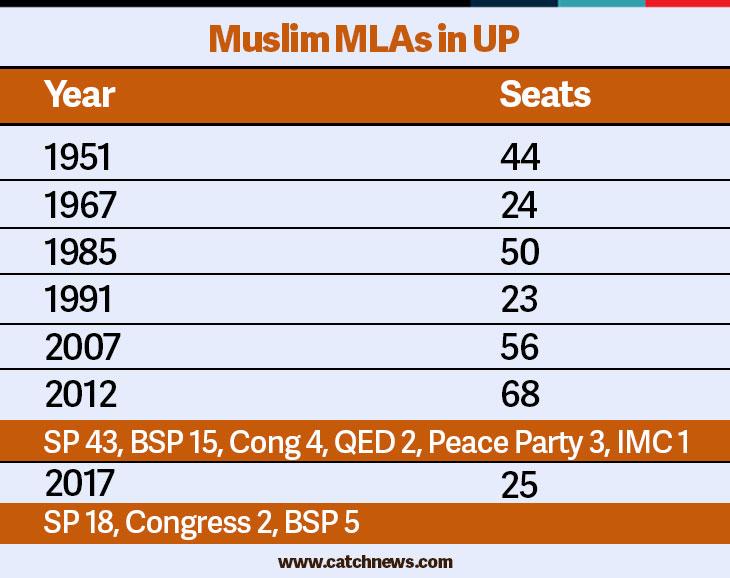Number of Muslim MLAs in UP falls to 25. Is this a cause for concern?

There was a sharp decline in the number of Muslim legislators elected to the Uttar Pradesh Assembly in the just-concluded polls, raising concerns that the House was headed the Lok Sabha way, which has no Muslim parliamentarian from the state.
Worrying numbers
A look at the list of new MLAs shows that only 25 Muslim legislators have been elected in 2017, although a hundred Muslims were fielded by the Bahujan Samaj Party (BSP) alone. The community's representation has slipped from a high of 17.1% in 2012 to 5.9%.

This is the second lowest figure after 1991, when 23 Muslims were elected at the height of the Ram Janmabhoomi movement.
The outgoing House had 68 Muslim legislators, while 56 Muslims were elected in 2007.
In 2012, the Samajwadi Party had 43 Muslim legislators, the BSP 15 and Congress four. The remaining six were from the Peace Party (3), Qaumi Ekta Dal (2) and the IMC (1).
The minority community constitutes over 20% of the state's population, although people like Imran Masood of the Congress claim their number to be more than double. While threatening Prime Minister Narendra Modi in one of his election rallies, Masood said: “There are 4% Muslims in Gujarat, there are 42% Muslims here. If he tries to convert UP into Gujarat, then we will chop him.”
Varying opinions
Maulana Khalid Rashid Firangimahali of the Aishbagh Eidgah in Lucknow squarely blamed the BSP for the poor results and the low representation of Muslims.
“After freedom, the highest number of Muslims elected was in 2012. It was because Mayawati had polarised the voters more than the Bharatiya Janata Party (BJP). There was no need for her to give tickets to so many Muslim candidates,” he said.
“Mayawati ne musalman, musalman itna kiya ki unka vote bank khisak gaya (she went around shouting 'Musalman' so much that her vote bank moved away from her).”
According to the Maulana, 70-80% of Muslims voted for the Samajwadi Party. He hoped that in 2019, all the parties would come together to form a credible opposition and stop the BJP.
On the other hand, Zafaryab Jilani, convenor of the All India Muslim Personal Law Board, is not worried about the decline in the number of Muslim legislators. “The fall is not much. Of the 47 seats won by the SP, 18 went to its Muslim candidates, more than 25%. Of the 19 BSP MLAs, five are Muslims, which again works out to 25%,” Jilani explained.
He was more concerned about the split in Muslim votes, for which the BSP was just one of the factors. In his opinion, polarisation was greater where there was no Muslim candidate.
“On at least 50 seats, there was a division of Muslim votes by more than 25% leading to the defeat of SP candidates,” Jilani said, asserting that 90% of Muslims voted for the SP.
On polarisation, he said that on more than 50 seats, local factors were responsible for polarisation.
“The division of secular votes also led to the debacle for SP,” he added.
He blamed the lack of effort on the part of the SP, the BSP and the Congress to counter the volunteers of the Rashtriya Swayamsewak Sangh, who, according to his information, went around spreading 'misinformation' about the Akhilesh Yadav government spending money on graveyards.
What these parties need to do, he said, was to counter the RSS with volunteer forces of their own.
First published: 16 March 2017, 18:09 IST





![BJP's Kapil Mishra recreates Shankar Mahadevan’s ‘Breathless’ song to highlight Delhi pollution [WATCH] BJP's Kapil Mishra recreates Shankar Mahadevan’s ‘Breathless’ song to highlight Delhi pollution [WATCH]](https://images.catchnews.com/upload/2022/11/03/kapil-mishra_240884_300x172.png)

![Anupam Kher shares pictures of his toned body on 67th birthday [MUST SEE] Anupam Kher shares pictures of his toned body on 67th birthday [MUST SEE]](https://images.catchnews.com/upload/2022/03/07/Anupam_kher_231145_300x172.jpg)






